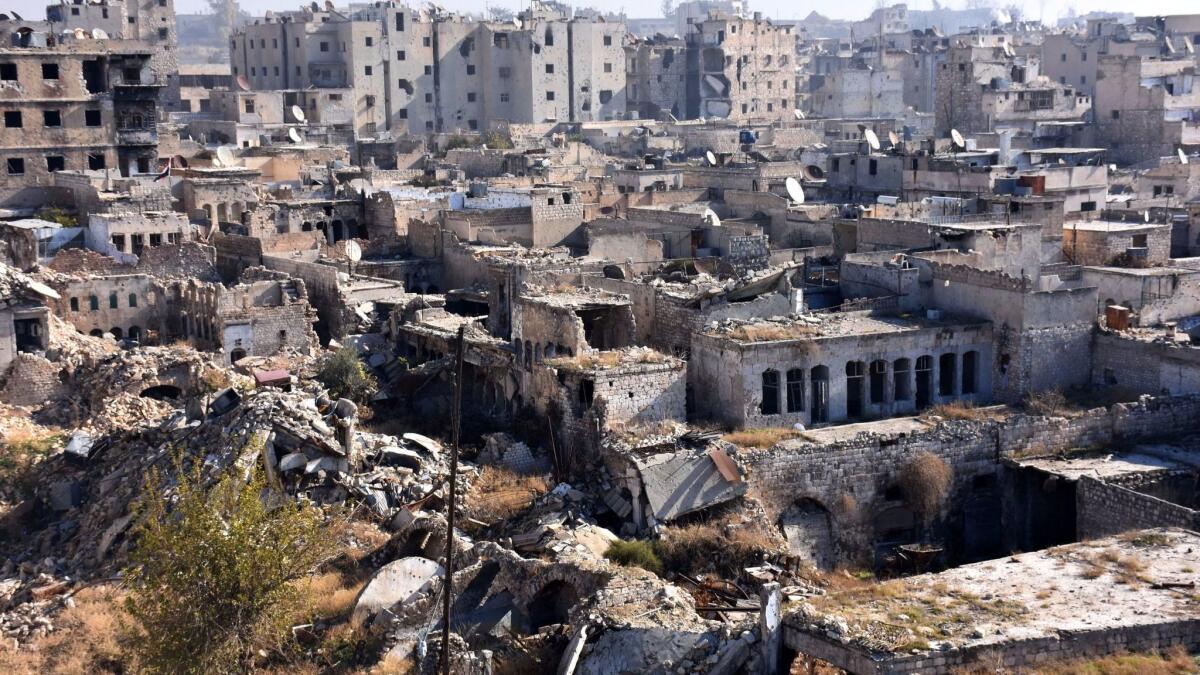Pentagon will send 200 more troops to Syria

- Share via
Reporting from Washington — The Pentagon plans to send 200 more troops into northern Syria to support rebel militias now holding positions about 15 miles from Islamic State’s self-declared capital of Raqqah, Defense Secretary Ashton Carter said Saturday.
Carter told a security conference in Manama, Bahrain, that the new troops will help train and assist the Syrian militias but will not engage in direct combat.
The increase, which was approved by President Obama, adds to 300 acknowledged U.S troops in Syria and comes as Syrian government forces backed by Russia have pounded rebels holding parts of Aleppo in the country’s multisided civil war.
The additional U.S. troops will include special operations forces, explosive ordinance disposal teams and trainers.
“This latest commitment of additional forces within Syria is another important step in enabling our partners to deal ISIL a lasting defeat,” Carter said, using an acronym for Islamic State.
The planned rebel offensive on Raqqah comes as Iraqi forces backed by the U.S.-led coalition are weeks into an assault on Mosul, the militants’ self-declared capital in Iraq and the largest city under its control anywhere.
Victory in either country would deal a considerable blow to Islamic State’s self-declared caliphate and eliminate a vital propaganda tool used to lure foreign fighters.
Obama would like to see the militants ejected from Mosul or Raqqah before he leaves office on Jan. 20, but it’s unclear whether either is likely. In any case, the militants still hold considerable territory in both countries outside those cities.
In recent weeks, advancing U.S.-backed rebel ground forces have retaken towns and cities around Raqqah and have cut off some supply routes to the city.
The Pentagon has backed the Syrian Democratic Forces, a loose alliance of fighters dominated by Syrian Kurds. They are now within 15 miles of Raqqah, Carter said.
“By combining our capabilities with those of our local partners, we’ve been squeezing ISIL by applying simultaneous pressure from all sides and across domains, through a series of deliberate actions to continue to build momentum,” he said.
Wary of sectarian conflict, the U.S. wants more Syrian Arab fighters in the Kurdish-run militias as they work toward predominantly Arab territories.
Col. John Dorrian, a Baghdad-based spokesman for the coalition against Islamic State, said Thursday that more Arab fighters have wanted to join the fight, including the so-called Syrian Elite Forces, which include people displaced from their homes in Raqqah by Islamic State.
The U.S. reliance on Kurdish forces has strained relations with Turkey, which views Syrian Kurdish forces as terrorists seeking to carve out their own territory along the border.
The Pentagon now has more than 6,000 troops in Iraq. U.S.-led coalition warplanes based outside Iraq and Syria have carried out thousands of airstrikes since mid-2014.
Although U.S. forces work mostly as advisors and trainers, five have died thus far fighting against Islamic State in Iraq and Syria.
The most recent death was Navy Senior Chief Petty Officer Scott Dayton, 42, of Woodbridge, Va. He died on Thanksgiving Day after a roadside bomb exploded near the northern Syrian town of Ayn Issa.
Twitter: @wjhenn
ALSO:
Climate change is real: Just ask the Pentagon
Overweight, tattooed, stoned? The Pentagon may still want you
More to Read
Sign up for Essential California
The most important California stories and recommendations in your inbox every morning.
You may occasionally receive promotional content from the Los Angeles Times.














